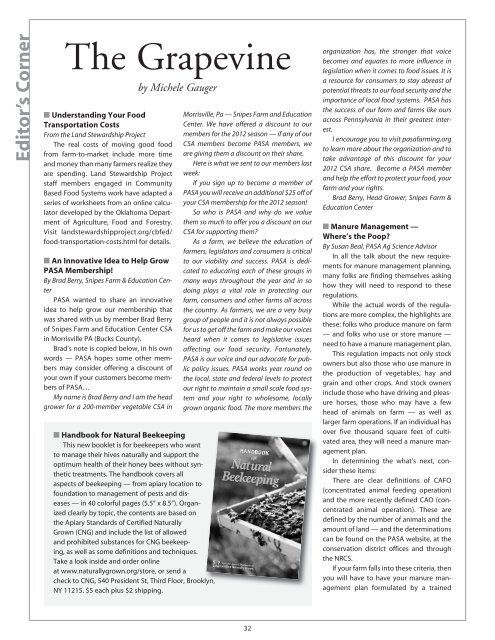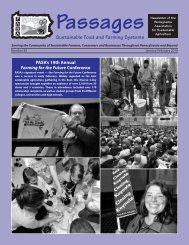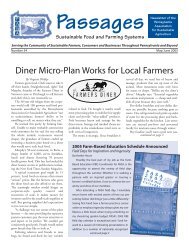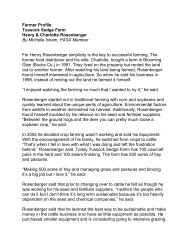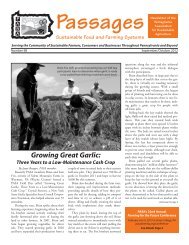Passages Sustainable Food and Farming Systems - PASA
Passages Sustainable Food and Farming Systems - PASA
Passages Sustainable Food and Farming Systems - PASA
Create successful ePaper yourself
Turn your PDF publications into a flip-book with our unique Google optimized e-Paper software.
Editor’s Corner<br />
The Grapevine<br />
■ Underst<strong>and</strong>ing Your <strong>Food</strong><br />
Transportation Costs<br />
From the L<strong>and</strong> Stewardship Project<br />
The real costs of moving good food<br />
from farm-to-market include more time<br />
<strong>and</strong> money than many farmers realize they<br />
are spending. L<strong>and</strong> Stewardship Project<br />
staff members engaged in Community<br />
Based <strong>Food</strong> <strong>Systems</strong> work have adapted a<br />
series of worksheets from an online calculator<br />
developed by the Oklahoma Department<br />
of Agriculture, <strong>Food</strong> <strong>and</strong> Forestry.<br />
Visit l<strong>and</strong>stewardshipproject.org/cbfed/<br />
food-transportation-costs.html for details.<br />
■ An Innovative Idea to Help Grow<br />
<strong>PASA</strong> Membership!<br />
By Brad Berry, Snipes Farm & Education Center<br />
<strong>PASA</strong> wanted to share an innovative<br />
idea to help grow our membership that<br />
was shared with us by member Brad Berry<br />
of Snipes Farm <strong>and</strong> Education Center CSA<br />
in Morrisville PA (Bucks County).<br />
Brad’s note is copied below, in his own<br />
words — <strong>PASA</strong> hopes some other members<br />
may consider offering a discount of<br />
your own if your customers become members<br />
of <strong>PASA</strong>…<br />
My name is Brad Berry <strong>and</strong> I am the head<br />
grower for a 200-member vegetable CSA in<br />
by Michele Gauger<br />
■ H<strong>and</strong>book for Natural Beekeeping<br />
This new booklet is for beekeepers who want<br />
to manage their hives naturally <strong>and</strong> support the<br />
optimum health of their honey bees without synthetic<br />
treatments. The h<strong>and</strong>book covers all<br />
aspects of beekeeping — from apiary location to<br />
foundation to management of pests <strong>and</strong> diseases<br />
— in 40 colorful pages (5.5” x 8.5”). Organized<br />
clearly by topic, the contents are based on<br />
the Apiary St<strong>and</strong>ards of Certified Naturally<br />
Grown (CNG) <strong>and</strong> include the list of allowed<br />
<strong>and</strong> prohibited substances for CNG beekeeping,<br />
as well as some definitions <strong>and</strong> techniques.<br />
Take a look inside <strong>and</strong> order online<br />
at www.naturallygrown.org/store, or send a<br />
check to CNG, 540 President St, Third Floor, Brooklyn,<br />
NY 11215. $5 each plus $2 shipping.<br />
Morrisville, Pa — Snipes Farm <strong>and</strong> Education<br />
Center. We have offered a discount to our<br />
members for the 2012 season — if any of our<br />
CSA members become <strong>PASA</strong> members, we<br />
are giving them a discount on their share.<br />
Here is what we sent to our members last<br />
week:<br />
If you sign up to become a member of<br />
<strong>PASA</strong> you will receive an additional $25 off of<br />
your CSA membership for the 2012 season!<br />
So who is <strong>PASA</strong> <strong>and</strong> why do we value<br />
them so much to offer you a discount on our<br />
CSA for supporting them<br />
As a farm, we believe the education of<br />
farmers, legislators <strong>and</strong> consumers is critical<br />
to our viability <strong>and</strong> success. <strong>PASA</strong> is dedicated<br />
to educating each of these groups in<br />
many ways throughout the year <strong>and</strong> in so<br />
doing plays a vital role in protecting our<br />
farm, consumers <strong>and</strong> other farms all across<br />
the country. As farmers, we are a very busy<br />
group of people <strong>and</strong> it is not always possible<br />
for us to get off the farm <strong>and</strong> make our voices<br />
heard when it comes to legislative issues<br />
affecting our food security. Fortunately,<br />
<strong>PASA</strong> is our voice <strong>and</strong> our advocate for public<br />
policy issues. <strong>PASA</strong> works year round on<br />
the local, state <strong>and</strong> federal levels to protect<br />
our right to maintain a small scale food system<br />
<strong>and</strong> your right to wholesome, locally<br />
grown organic food. The more members the<br />
organization has, the stronger that voice<br />
becomes <strong>and</strong> equates to more influence in<br />
legislation when it comes to food issues. It is<br />
a resource for consumers to stay abreast of<br />
potential threats to our food security <strong>and</strong> the<br />
importance of local food systems. <strong>PASA</strong> has<br />
the success of our farm <strong>and</strong> farms like ours<br />
across Pennsylvania in their greatest interest.<br />
I encourage you to visit pasafarming.org<br />
to learn more about the organization <strong>and</strong> to<br />
take advantage of this discount for your<br />
2012 CSA share. Become a <strong>PASA</strong> member<br />
<strong>and</strong> help the effort to protect your food, your<br />
farm <strong>and</strong> your rights.<br />
Brad Berry, Head Grower, Snipes Farm &<br />
Education Center<br />
■ Manure Management —<br />
Where’s the Poop<br />
By Susan Beal, <strong>PASA</strong> Ag Science Advisor<br />
In all the talk about the new requirements<br />
for manure management planning,<br />
many folks are finding themselves asking<br />
how they will need to respond to these<br />
regulations.<br />
While the actual words of the regulations<br />
are more complex, the highlights are<br />
these: folks who produce manure on farm<br />
— <strong>and</strong> folks who use or store manure —<br />
need to have a manure management plan.<br />
This regulation impacts not only stock<br />
owners but also those who use manure in<br />
the production of vegetables, hay <strong>and</strong><br />
grain <strong>and</strong> other crops. And stock owners<br />
include those who have driving <strong>and</strong> pleasure<br />
horses, those who may have a few<br />
head of animals on farm — as well as<br />
larger farm operations. If an individual has<br />
over five thous<strong>and</strong> square feet of cultivated<br />
area, they will need a manure management<br />
plan.<br />
In determining the what’s next, consider<br />
these items:<br />
There are clear definitions of CAFO<br />
(concentrated animal feeding operation)<br />
<strong>and</strong> the more recently defined CAO (concentrated<br />
animal operation). These are<br />
defined by the number of animals <strong>and</strong> the<br />
amount of l<strong>and</strong> — <strong>and</strong> the determinations<br />
can be found on the <strong>PASA</strong> website, at the<br />
conservation district offices <strong>and</strong> through<br />
the NRCS.<br />
If your farm falls into these criteria, then<br />
you will have to have your manure management<br />
plan formulated by a trained<br />
32


